30 Social Media Lies Everyone Tells on Facebook and Instagram

These days, most of us are on at least one social media platform. And while Facebook and Instagram may seem like good ways to connect with friends, colleagues, and family members you don’t see too often, a lot of it is smoke and mirrors. People go out of their way to present the best version of themselves on social media, even if that version isn’t exactly real. So while your former flame may seem smitten with their new significant other, just know that their lovey-dovey comments on each other’s photos don’t show the whole story. Plus, with filters and photoshopping, you can’t compare the way you look every day to someone’s carefully crafted Instagram photos. With so many opportunities to create “better” versions of ourselves online, chances are high even you’ve told a fib or two on Facebook. It’s time to get real and talk about the social media lies everyone’s been guilty of telling at some point.
1
Lying about your accomplishments

Everyone wants someone to be proud (or envious) of them. But this need to have other people view your successes and accomplishments as something extraordinary has created a culture of fabricating or exaggerating them, especially on social media.
Mike Bran, founder of Thrill Appeal, says this is something he sees all too often because people “want to be acknowledged.” For instance, a lazy coworker who got moved into another position because they weren’t performing well in their other role might go online and say they “got a promotion,” so that people see the switch in a positive light rather than a negative one.
2
Embellishing your importance at work

We all want to seem like we’re the top dog at our office—so much so that many people will embellish the importance of their role in their company on social media. Shaun McDonough explained on Quora that he worked with people who were happier to receive an “inflated” job title over a pay raise, since most people will know of your title but not your salary.
3
Acting as if your job is more glamorous than it really is

What you’re posting on social media: photo booth shots from your company’s holiday party, that one time a celebrity came into your office, or that huge bottle of Veuve Clicquot your boss got as a congratulatory gift when she was promoted. What you’re not showing: restocking the mini-fridge for clients, that air conditioning leak that’s leaving a water stain on the carpet, and the co-worker who can’t pass by your desk at the beginning of the week without asking if you’ve got “a case of the Mondays.” Even the thing people complain about the most—their jobs—is something they can’t help but glamorize on social media.
4
Exaggerating the highlights of your travels

Of course that photo in front of the Eiffel Tower and perfectly-timed picture of an ocean wave are beautiful, but they don’t show the ins-and-outs of your travels. They don’t show you racing to your gate, almost missing your flight. They don’t show you grumpy and jet-lagged, unable to leave your mediocre hotel room. But when vacationing, people only show the best parts of their trip.
A 2019 Jet Cost survey of more than 4,000 Americans showed that two-thirds admitted to “lying about their experiences with the weather, quality of accommodation, and amount of sightseeing done” when traveling, as Travel Pulse reported. So the next time you’re unhappy with a vacation, know that most people have experienced the same thing—even if they don’t post about it.
5
Or just lying about the places you’ve visited

And some people will go so far as to lie about the places they’ve visited entirely. Whether it’s fabricating a vacation or just lying to people about having gone somewhere in the past, this is not an uncommon social media practice. In fact, the idea blew up so much that there was a viral video trend where YouTubers would “fake” a trip on their social media profiles, proving how easily it can be done.
6
Pretending to be in better financial standing than you are

Whether it’s the flash of dollar bills on a video screen or showing off things online that you can’t actually afford, people are always trying to make themselves seem richer than they are. Having designer items means you have money, so you post a photo of a designer bag from the store instead of actually purchasing it—but no one has to know that, of course. Even the phenomenon of people posing in front of luxury cars that aren’t actually theirs is an example of this. It’s all about seeming like you have a wealth.
7
Feigning a “healthy” lifestyle
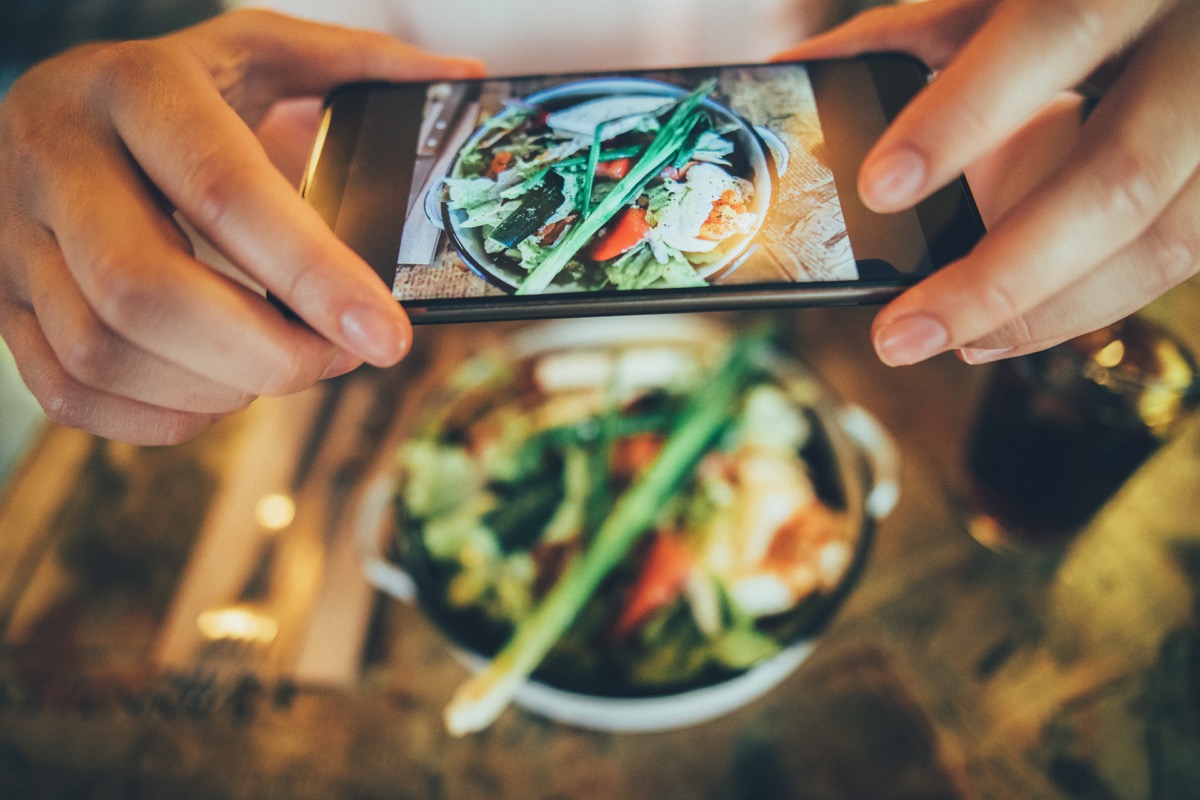
We understand. You eat one kale salad, and you want the world to know you’re turning over a new leaf, if you will. However, more often that not, that isn’t the case. Natalie Levy, founder of She’s Independent, says this idea of wanting people to view you as “healthy” coincides with an eating disorder called orthorexia. This is where people are obsessed with eating foods that “people view as healthy,” whether or not they’re actually consuming it in healthy ways.
8
Lying about your fitness regimen

On that same note, people will also lie about their workouts. As Levy points out, many fitness professionals or junkies actually have “workout disorders or body disorders.” But do they showcase that reality online? Not quite. Instead, they “showcase the physical and speak to their success and achievements but don’t touch on much more than the physical and brands they co-promote,” Levy says. This, in return, causes people to unhealthily compare themselves to fitness goals that may be unrealistic because it’s what they see being promoted online.
9
Acting as if you know about more than you actually do

It’s simple to create a facade of knowledge online. Post a photo of Tolstoy’s Anna Karenina and people will think you’re an intelligent, well-read human being—even if you never made it past page one. As Karl Taro Greenfield wrote for The New York Times, with the emergence of the internet, “it’s never been so easy to pretend to know so much without actually knowing anything.”
10
Misrepresenting the realities of parenthood
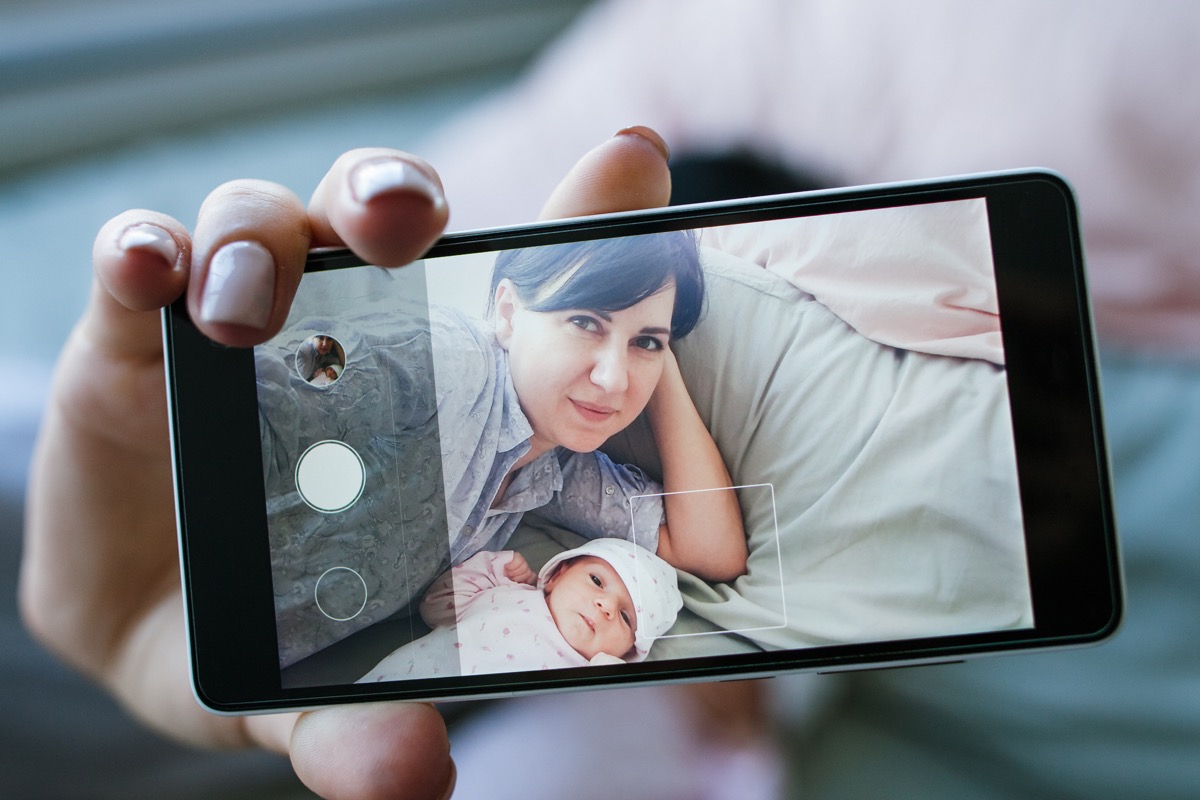
Your followers may think your children are “perfect little angels” if that’s all you show about them online. But the realities of parenting are far more complicated than that. In fact, sociologist Koyel Bandyopadhyay wrote on Quora that parents who are obsessed with social media actually pass unhealthy complexes onto their children. “Parenting becomes a competition, and children try to keep up with their parents’ ambitions,” she wrote. “These issues of affirmation and competition percolate to children, who feel invested in their performative capacities, aspiring to be ‘perfect kids.'”
11
Pretending to always be happy

In Donna Freitas’ The Happiness Effect, an overwhelming 73 percent of students she surveyed said they “always try to appear positive and happy with anything attached” to their real names. Whether it’s posting an old smiling selfie when you’re actually in bed crying or tweeting about how #blessed you are when you’re struggling mentally and emotionally, it’s clear life isn’t always what it seems on social media.
12
Or pretending to be in a happy, healthy relationship

Based solely on social media, everyone’s relationship is basically a well-directed romantic comedy. But people who turn to Facebook or Instagram to boast about their romance more often than not are actually hiding something. Spoiler alert: Their relationship probably isn’t really that great. In a 2018 survey from relationship counseling organization Relate, more than half of millennials (51 percent) admitted to making their relationship seem happier online than it really is, and 42 percent worked to carefully craft a “perfect relationship” online. In reality though, all of these couples are having disagreements behind the screen.
13
Lying about your single status

On the other hand, dating expert Laurel House says some partners will go the opposite route and not post about their significant other at all on social media. Many people create a fake persona online as if they’re living a single life when they actually have someone at home. They keep their relationship hidden so they can flirt with other people or even cheat without anyone knowing they truth.
14
Acting as if you’re over an ex

Who among us hasn’t gotten out of a relationship and then posted a photo where we look happier than ever to show the world—but mainly our ex—that we’re thriving? In fact, there are entire articles online dedicated to coaching people on how to act on social media after a breakup. But just because we don’t all wear our heartbreak on our social media sleeve, that doesn’t mean we aren’t experiencing it.
15
Faking flawless skin

It’s easy to compare your raw, acne-scarred, dry skin to someone else’s complexion in an Instagram photo, but you’re just holding yourself up against a false representation. As Stacy Caprio, creator of the AcneScar blog, reminds us, the truth is no one has “perfect skin.” The photos you’re comparing your skin to have filters on them and have possibly been “smoothed” out by tools like Facetune or Photoshop.
16
Posting “no makeup” selfies that stretch the truth

Who’s to say those #nomakeup selfies are actually makeup-free? It’s easy to hide a little concealer here or some mascara there. And even if you are truly bare-faced, you can use angles, filters, and smoothing tools to aide in that so-called “natural” facade.
Besides, you can’t compare your natural skin to makeup-free celebrity photos. “Their selfies—although gorgeous and empowering—offer potentially harmful examples as to what natural beauty should look like,” Brianna Arps wrote for Insider. “Among the things not discussed, perhaps, are the faux eyelash extensions, lip fillers, doctored eyebrows, and expensive spa treatments that many celebrities pay for that the average person simply cannot afford.”
17
Or solely showing the glamorous side of self-care
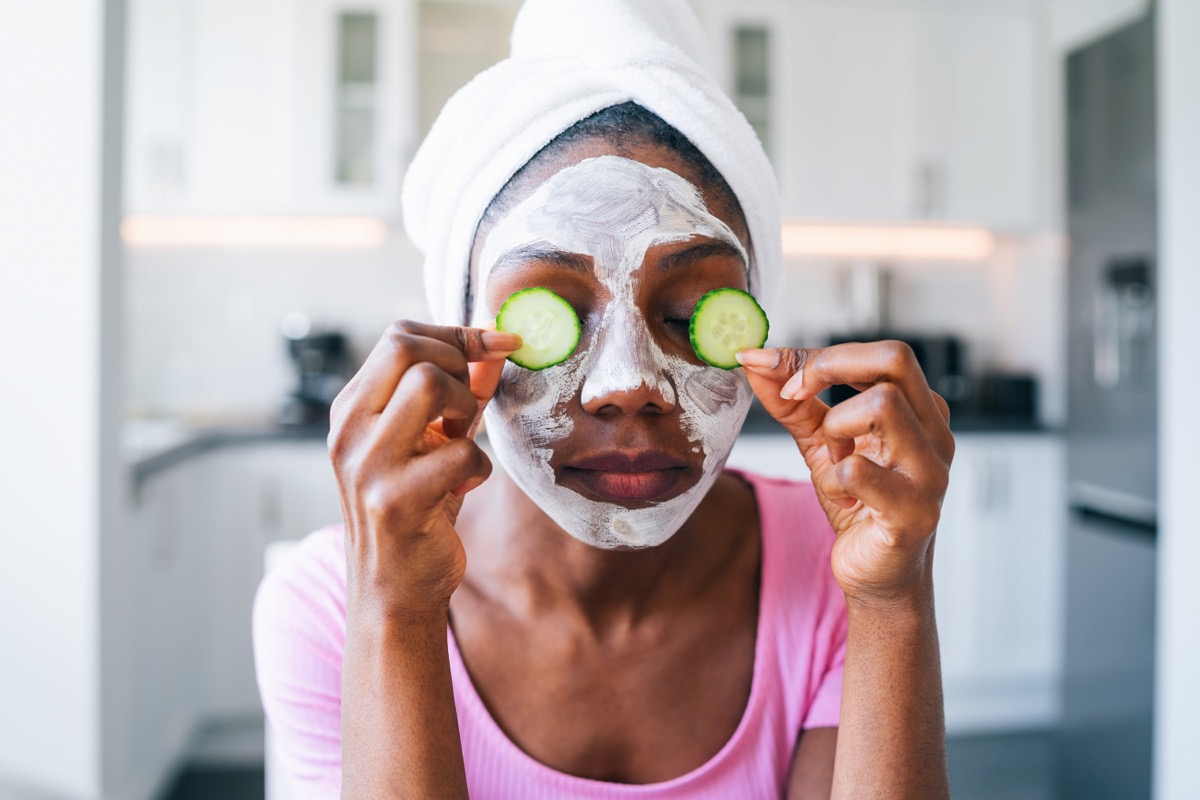
On social media, someone might post a photo of themselves wearing a face mask and getting a pedicure with the hashtag #treatyourself. But the reality is that self-care isn’t always a glitzy, glamorous thing. Sometimes it’s finally doing your laundry after letting it pile up for weeks or taking a shower after spending days laying in bed depressed. As Mawiyah Patten wrote for The Mighty, what people don’t often tell you is that self-care includes “activities you want to put off indefinitely.” “Self-care sometimes means making tough decisions which you fear others will judge,” Patten continued. “Self-care involves asking for help; it involves vulnerability; it involves being painfully honest with yourself and your loved ones about what you need.” In short, #selfcare is not just a bath bomb video you upload on your Instagram story.
18
Pretending you’re neater than you are

We’ve all had that moment where we’ve gone to take a picture, put our phone down, and quickly scrambled to straighten up the landscape behind our photo subject. After all, our social media followers can’t know how messy we are! But just because no one’s clutter makes its way onto their social media feed, that doesn’t mean it doesn’t exist.
19
Deleting the past

With a simple push of the “delete” button, it’s easy to make it appear as if things about your past just never happened. Did you have a musician you liked when you were a teen who you posted about incessantly? If you don’t want anyone to know about your former guilty pleasure, you can simply delete those posts. There is such a thing as a lie by omission.
20
Overinflating your health situation

Being sick is never pleasant, but the average cold is rarely life-threatening. That said, many people tend to make it seem as though their prognosis is dire. It’s the online version of wanting your mom to take care of you when you’re sick, except this time, it’s the entirety of Facebook. If someone is actually gravely ill, one of the last things on their mind is taking an E.R. selfie or a photo of their medical band.
21
Pretending to be friends with everyone and anyone

Everyone strives to appear more “social” on social media than they actually are. After all, people want it to seem like they have a lot of friends who always want to hang out with them.
And sure, it may have been cool to get invited to the VIP section or meet that A-lister, but if you’re attempting to draw attention to your relationships online, chances are they’re not as strong as you’re making them out to be.
22
Lying about the circumstances of an event

Similarly, if a certain event or circumstance isn’t exactly the story someone wants their followers to know, they may take parts of it and change the narrative through social media. Psychologist and social media strategist Louise Sattler says she sees this often with the people she works with. For instance, attending the same party as a celebrity or someone high profile is not the same as knowing them or “working” with them and their affiliates. But people will stretch the truth of their experiences to make themselves seem “cooler” online.
23
Not showing the reality of your “fun” night out

Those pictures of you dancing with an oversized margarita in your hand may make it look like every night of your life is a party. What most people are intentionally leaving out, however, is the embarrassing stumble home, the one-person Gatorade-chugging contest you had when you got there, and the pounding headache you’re still dealing with a day later.
24
Pretending people are more interested in your life than they are

Any post on social media that starts, “I know you’ve all been wondering…” is likely the beginning of a lie. In fact, for many people, it’s common practice to set up these carefully-constructed untruths with a little “vaguebooking” beforehand, dropping a well-placed “They know what they did” or “Huge news today! Can’t talk about it just yet.” But, chances are, people haven’t been asking or even wondering.
25
Presenting other people’s content as your own
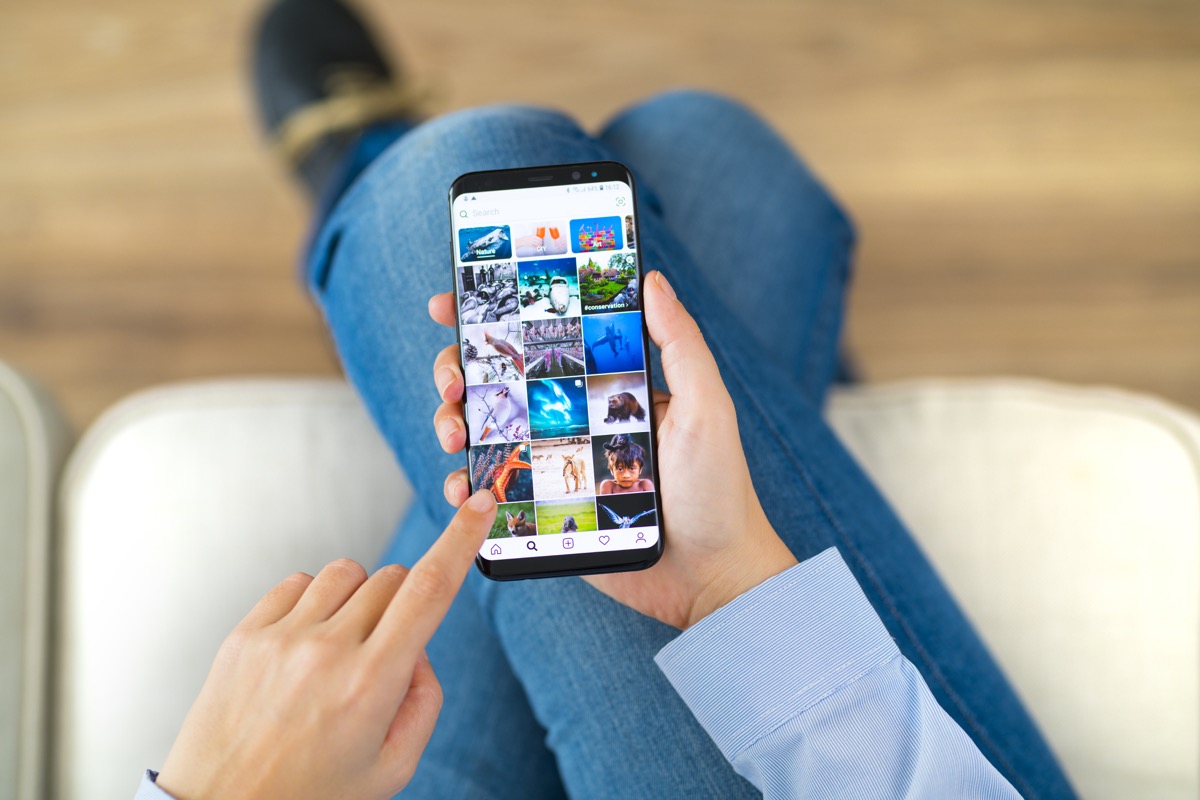
In a world where it’s so important to appear authentic—but not necessarily to be authentic—the push for original content is greater than ever. But even if someone boasts about their content being original, it may not be. There are plenty of people online who take other people’s work and try to pass it off as their own. In fact, one Reddit user said they actually knew of “well-respected bloggers” who would buy stock images, edit them, and post them as if they were photos they had actually taken themselves.
26
Pretending to be environmentally conscious

People tend to jump on trends quickly, even if they’re not actually implementing them in their own life. That’s what happened with the eco-friendly movement. People would tweet #savetheturtles, but buy five plastic water bottles from the store the same week.
In a 2016 survey from Trulia of more than 2,000 Americans, 79 percent of respondents said they considered themselves to be environmentally conscious. However, only 26 percent said they actually do anything beyond recycling sometimes and turning off the lights every so often.
27
Overinflating your charitable nature

Many people inflate their good deeds and good nature online when they’re not actually going out of their way to volunteer or even donate to charity. In fact, the U.S. Bureau of Labor Statistics reported that only around 25 percent of Americans actually volunteered at least once from Sept. 2014 to Sept. 2015. Not a terribly promising statistic, especially for the amount of people who brag about their generosity and social consciousness online.
28
Exaggerating your level of political activity
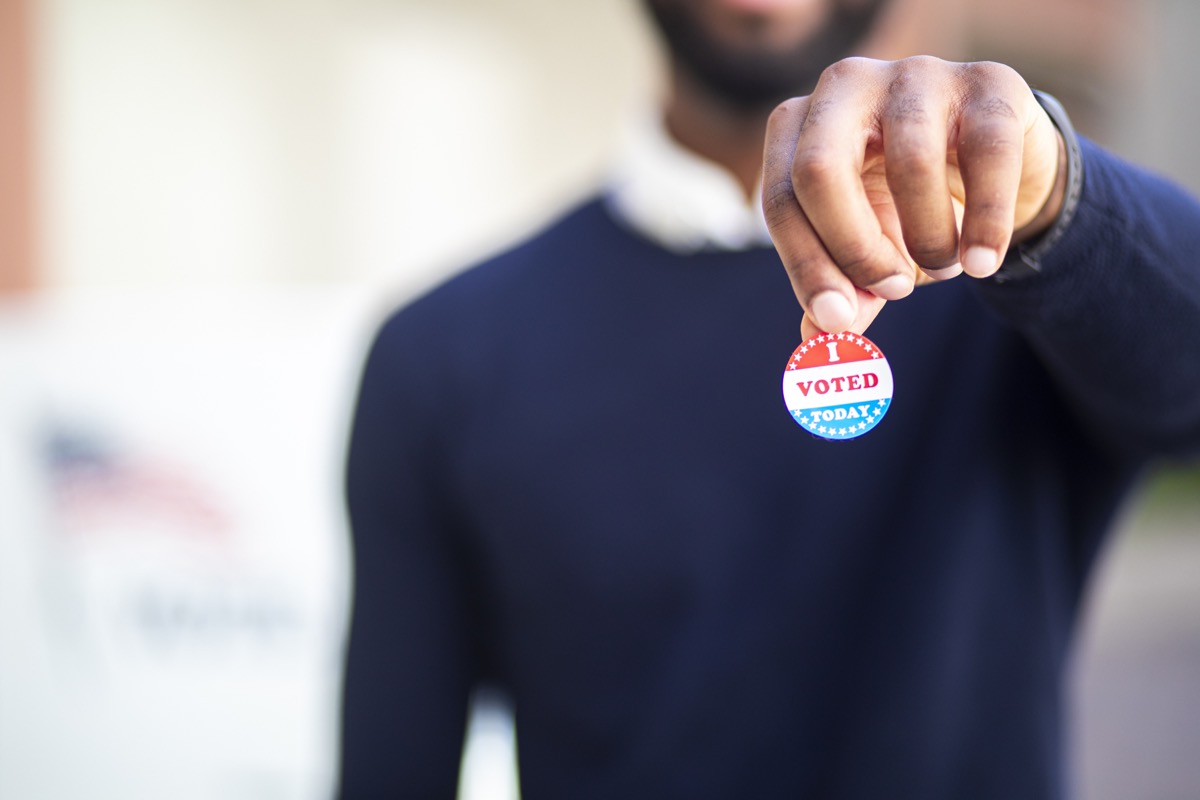
It’s easy to share countless political posts on Facebook without actually spending much time being involved in any political activities. People on social media love pretending they’re on the pulse of politics, dedicating hours to canvassing and calling voters. But considering that the Bipartisan Policy Center revealed that just over 50 percent of registered voters actually made it to the polls in 2012, odds are that “I Voted” sticker marks the extent of your political activity.
29
Lying about your age

As people get older, they have a tendency to want to hold on to their youth, even if they have to lie to do so. But they’re not the only ones possibly lying about their age online. To have a Facebook account, you have to be 13 years old or older. But through a 2013 Advertising Standards Authority survey, The Guardian reported that 83 percent of children between the ages of 11 and 15 had registered on social media platforms using a false age.
30
Acting as if you don’t care

While you may not let everything other people think get to you, those posts proclaiming that you couldn’t care less about other people’s opinions are woefully transparent. Why are you posting it for other people to see, then? The entire purpose of social media is to post things for a reaction—if you truly didn’t care, you’d log off for good and become a social media naysayer.
Additional reporting by Sarah Crow.